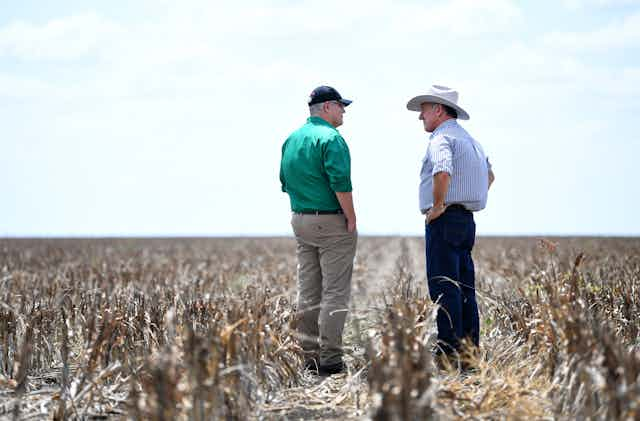The government will provide concessional “drought loans” for small businesses dependent on agriculture, as well as improving the terms of loans under the existing scheme for farmers, in a package approved by cabinet on Wednesday.
Measures to be unveiled on Thursday also include hundred of millions of dollars of direct investment into communities.
The initiatives come after intense pressure on the Coalition to do more for those hit by one of the country’s worst-ever droughts, with Scott Morrison very sensitive to how the issue is playing not just in the regions but among metropolitan voters.
Costings were still being finalised late Wednesday but sources said the package was worth more than $500 million.
The business drought loans will be up to $500,000. They will include a two year interest free period and interest only payments for years three to five, with interest and principal repayments in years six to ten.
Those set to benefit would include harvesting and shearing contractors, carriers, stock and station agents, and businesses dealing in agricultural equipment and repairs.
Businesses not directly linked to the farming sector – such as the local hairdresser or newsagent – would not be eligible.
The loans will be made through the Regional Investment Corporation – a Commonwealth body - with a small business defined as one with 19 or fewer employees.
The loans will be available immediately and no legislation is needed.
The improved terms for farmers loans will be see up to two years interest free, interest only payments for years three to five, and interest and principal payments for years six to ten. The current arrangements are interest only for the first five years and principal and interest for the rest of the 10 year loan.
The former co-ordinator-general for drought, Stephen Day, told the government that concerns had been constantly raised with him about the survival of small businesses in areas in drought.
Morrison said these businesses had been forced to seek overdrafts or other finance.
“Rural communities can’t function without these small businesses – that’s why we’re stepping in to provide this extra support,” he said.
The government says its planned extra direct investment will flow into projects that boost local businesses and jobs.
Six more local government areas will be added to the Drought Communities Program, at a cost of $6 million, and another $122 million will be available for the 122 local councils which have already received support of $1 million each.
The program funds infrastructure and local activities. An extra $50 million discretionary fund will support additional councils when needed. But this will be after a review of the program early in the new year.
Some $200 million will be redirected from the Building Better Regions Fund to set up a Special Drought Round, providing up to $10 million per project in local government areas.
Supplementary payments will be made under the Roads to Recovery program for 128 local government areas in drought for upgrades and maintenance. This is a re-purposing of $138.9 million.
Drought minister David Littleproud said the federal package was not linked to any requirement for state funding, which would have carried the risk of the states not matching the money. But he called on state governments to provide some relief on rates and payroll tax.
“We’re going to cut the cheque and we’re going to get the money out, because that’s what these local economies need now. They need stimulation …. We’re not going to play politics, we’re going to get on with the job and deliver, and hopefully the states will complement us with things like rate relief and also payroll tax”.
Deputy Prime Minister Michael McCormack said: “This suite of measures go to the heart of what matters to these communities. From small businesses to primary producers, we are working with communities to take the pressure off one of the worst droughts in history.
"Not only is the government continuing to respond as the drought progresses, but we are working on measures to assist in the recovery when the rains come, which includes the government’s billion dollar investment in water infrastructure.”
Agriculture Minister Bridget McKenzie said: “I know our farmers and our communities are doing it really tough right now but despite the current drought Australian agriculture has a bright future”.

